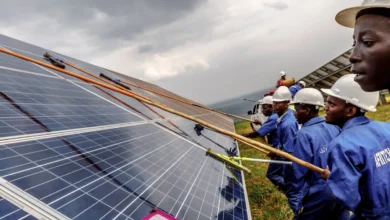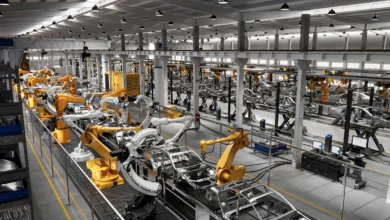Why Flexible Solar Panels Are a Smart Best Choice for Your Home
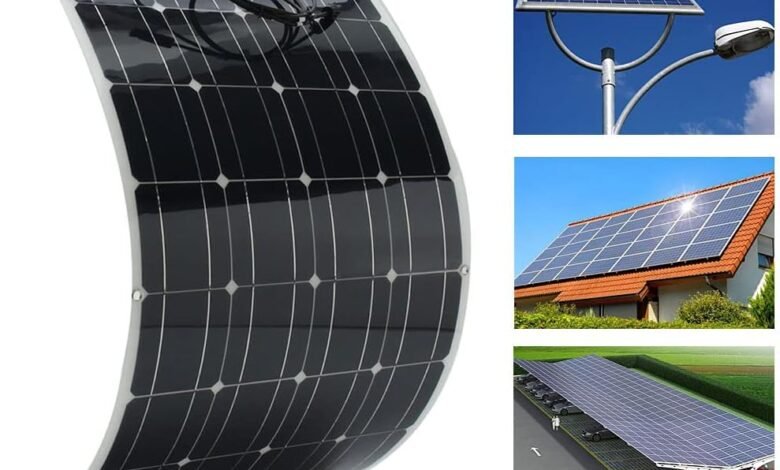
Flexible solar panels are an exciting new way to use solar energy. Unlike traditional panels, flexible solar can bend and fit different surfaces. This makes them perfect for tricky spots like curved roofs or small spaces.
If you’re thinking about switching to solar energy, flexible solar panels might be just what you need. They are lightweight and easy to install, which can save you time and money. Plus, they still work well even when the weather isn’t perfect.
What Are Flexible Solar Panels
Flexible solar panels are a type of solar panel that can bend and shape to fit different surfaces. Unlike regular solar panels, which are flat and rigid, flexible ones are made from materials that allow them to flex. This makes them very versatile and useful in many places where traditional panels might not work.
Flexible solar use special materials like thin-film technology. This technology allows the panels to be lightweight and bendable. Because of this, you can use them on surfaces that aren’t flat, like curved roofs or small spaces on boats or RVs. They still capture sunlight to create energy, just like traditional panels.
Overall, flexible solar are a great option if you need something that can fit in unusual places. Their flexibility makes them adaptable to various surfaces, and they are still efficient in converting sunlight into energy.
How Do Flexible Solar Panels Work
Flexible solar panels work by using materials that convert sunlight into electricity. These panels have a special layer that captures sunlight. When sunlight hits this layer, it creates electrical energy. This process is similar to how regular solar panels work but with a flexible design.
The technology inside flexible panels is called thin-film technology. This allows the panels to be thin and bendable. As sunlight strikes the panel, the energy is collected and can be used to power devices or stored in batteries. This means you can use flexible solar to generate electricity in various settings.
Thanks to their design, flexible solar can be installed in many places. They are especially useful in spots where traditional panels wouldn’t fit. Whether on a boat, RV, or a curved roof, these panels still work efficiently to provide energy.
Advantages of Flexible Solar Panels
Flexible solar panels have many advantages. First, they are lightweight and easy to handle. This makes them easier to install in tricky spots where heavy panels might not fit. You can use them on curved surfaces or small spaces without much trouble.
Another benefit is their adaptability. Since they can bend, flexible solar can be used on different types of surfaces. This flexibility means they can be installed in places where regular panels might not work. Additionally, they are durable and can handle various weather conditions.
Flexible solar offer convenience and versatility. Their lightweight and adaptable nature make them a great choice for various applications. They bring solar power to places where traditional panels might not be suitable.
Flexible Solar Panels vs. Traditional Solar Panels
When comparing flexible solar panels to traditional solar panels, there are some key differences. Flexible panels are bendable and lighter, while traditional panels are rigid and heavier. This makes flexible panels easier to install in tight or curved spaces.
Traditional solar panels are often more durable and have a longer lifespan. They are also more efficient at capturing sunlight. However, flexible solar have their own advantages, such as their ability to fit in unusual places and their lower weight. This makes them a great option for specific needs.
Choosing between flexible and traditional solar panels depends on your needs. If you need to install panels on a curved surface or in a small space, flexible solar panels might be the best choice. For more durable and efficient energy production, traditional panels might be better.
Where Can You Use Flexible Solar Panels
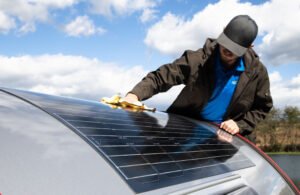
Flexible solar panels can be used in many different places. They are perfect for areas with curved or irregular surfaces, like on boats or RVs. Since they can bend, they fit well on surfaces that traditional panels can’t handle.
You can also use flexible solar on roofs that aren’t flat. They work well on both residential and commercial buildings where a traditional solar panel setup might not be practical. Their adaptability makes them useful for a variety of applications, including camping or outdoor activities.
flexible solar offer a versatile solution for generating solar energy in places where traditional panels might not work. Their ability to conform to different shapes makes them a handy option for various settings.
Installing Flexible Solar Panels: A Simple Guide
Installing flexible solar panels is a straightforward process. First, you’ll need to choose the right location for the panels. Since they are bendable, you can place them on surfaces that are not flat. Make sure the area gets plenty of sunlight for the best results.
Next, clean the surface where you’ll be installing the panels. This ensures that the panels stick properly. After cleaning, you can apply the panels according to the instructions. Many flexible panels come with adhesive backing, making installation easier.
connect the panels to your power system. Flexible solar usually come with detailed instructions on how to do this. Once connected, they will start generating electricity from the sunlight, providing power to your devices or home.
Cost of Flexible Solar Panels: What to Expect
The cost of flexible solar panels can vary depending on the size and brand. Generally, they are priced higher than traditional panels due to their advanced technology. However, their unique features can justify the cost for certain applications.
When buying flexible solar, consider both the initial cost and potential savings. While they may cost more upfront, their adaptability and ease of installation can lead to long-term savings. Additionally, their ability to fit in tricky spaces can save on installation costs.
flexible solar panels may have a higher initial cost, but their benefits can make them a worthwhile investment. They offer flexibility and convenience, which can make them more cost-effective in the right situations.
Durability and Maintenance of Flexible Solar Panels
Flexible solar panels are designed to be durable and withstand various weather conditions. They are made from materials that are resistant to damage, making them a reliable choice for many applications. They can handle rain, wind, and even some impacts.
Maintenance for flexible solar is usually simple. Regular cleaning helps keep them in good condition and ensures they work efficiently. Unlike traditional panels, flexible ones are less likely to break or crack because they are more flexible and less fragile.
flexible solar are durable and easy to maintain. Their robust design means they can provide reliable solar energy with minimal upkeep. This makes them a practical choice for both home and outdoor use.
Are Flexible Solar Panels Good for Your Home
Flexible solar panels can be a great addition to your home. They offer flexibility and can be installed in areas where traditional panels might not fit. This makes them a good choice for unique roof designs or limited space.
They are also efficient in converting sunlight into electricity. Even though they are flexible, they still perform well and can help reduce your energy bills. Their adaptability makes them a useful option for homeowners looking to install solar power in unconventional places.
flexible solar can be a good fit for your home. Their versatility and efficiency make them a practical choice for various residential settings.
Flexible Solar Panels for RVs and Boats
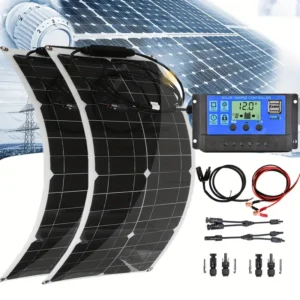
Flexible solar panels are ideal for RVs and boats. Their bendable nature allows them to fit on curved surfaces, which is perfect for the unique shapes of RV roofs and boat decks. This means you can generate solar power even when you’re on the go.
Installing flexible solar on RVs and boats can help you save energy while traveling. They are lightweight and easy to install, which is beneficial for mobile setups. They also work well in various weather conditions, ensuring you have a reliable power source wherever you are.
Flexible solar are a great choice for RVs and boats. Their ability to conform to different shapes and their lightweight design make them perfect for mobile energy needs.
How Much Energy Can Flexible Solar Panels Produce
Flexible solar panels can produce a significant amount of energy, depending on their size and placement. While they may not always match the energy output of traditional panels, they still provide a good amount of power for many uses.
The energy production of flexible solar panels depends on factors like sunlight exposure and the panel’s efficiency. They work well in various lighting conditions and can generate enough power for small to medium-sized applications. Their flexibility does not mean they compromise on performance.
Overall, flexible solar panels are capable of producing a reliable amount of energy. Their efficiency and versatility make them a useful option for various energy needs.
Conclusion
Flexible solar panels are a fantastic choice if you need solar energy in unusual places. They can bend and fit on curved surfaces, making them perfect for tricky spots like boat decks or RV roofs. Even though they are different from traditional panels, they still work well and help you save on energy bills.
Overall, if you’re looking for a solar power solution that adapts to your needs, flexible solar are worth considering. They offer flexibility, are easy to install, and can be used in many different settings. With their benefits, they might just be the right option for your home or outdoor adventures.


